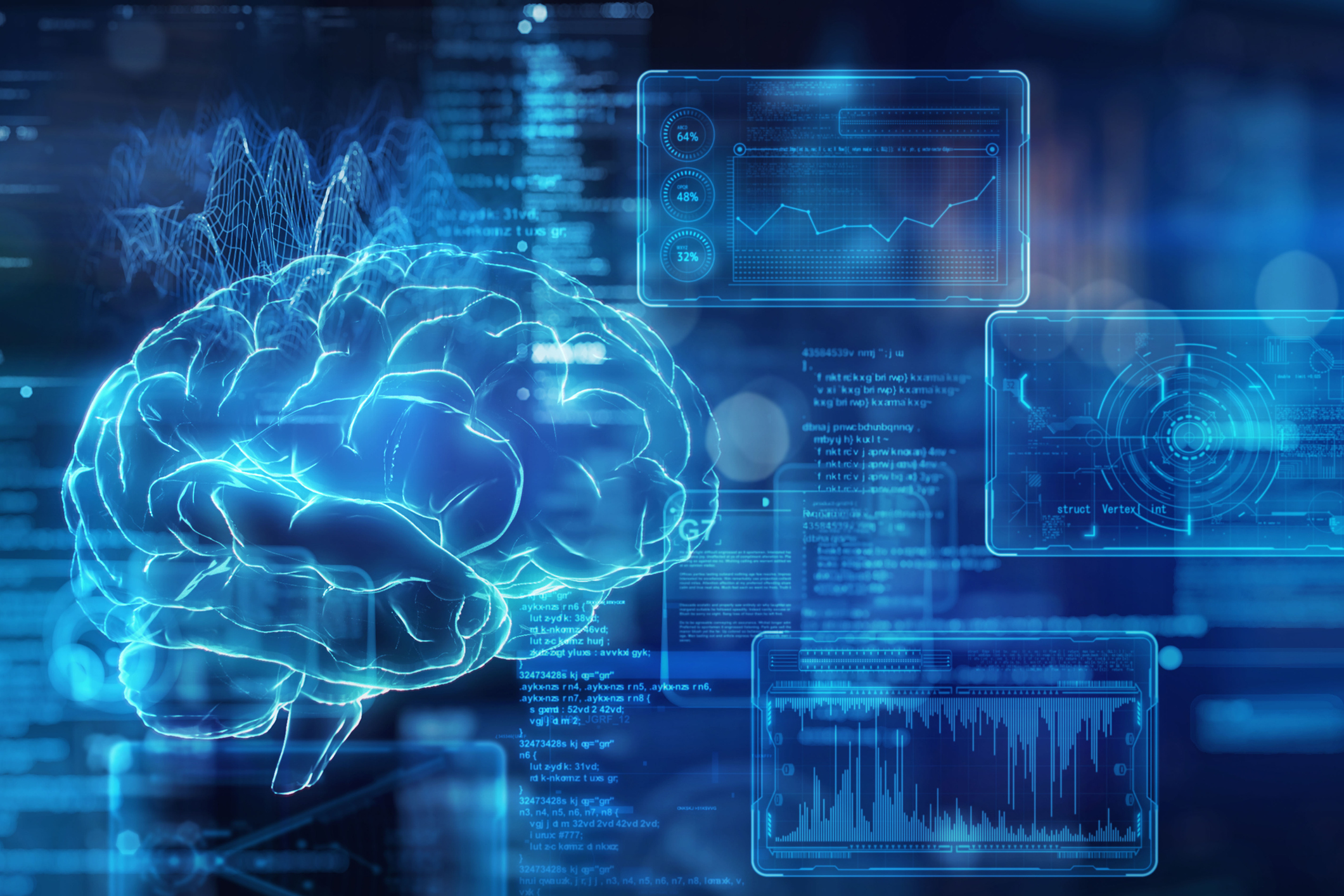AI Start-ups Keep Scoring Huge Sums
Investors continue to make bigger bets on artificial intelligence start-ups, even for small teams with no revenue. Some backers think a startling tech breakthrough is near.


Profit and prosper with the best of Kiplinger's advice on investing, taxes, retirement, personal finance and much more. Delivered daily. Enter your email in the box and click Sign Me Up.
You are now subscribed
Your newsletter sign-up was successful
Want to add more newsletters?

Delivered daily
Kiplinger Today
Profit and prosper with the best of Kiplinger's advice on investing, taxes, retirement, personal finance and much more delivered daily. Smart money moves start here.

Sent five days a week
Kiplinger A Step Ahead
Get practical help to make better financial decisions in your everyday life, from spending to savings on top deals.

Delivered daily
Kiplinger Closing Bell
Get today's biggest financial and investing headlines delivered to your inbox every day the U.S. stock market is open.

Sent twice a week
Kiplinger Adviser Intel
Financial pros across the country share best practices and fresh tactics to preserve and grow your wealth.

Delivered weekly
Kiplinger Tax Tips
Trim your federal and state tax bills with practical tax-planning and tax-cutting strategies.

Sent twice a week
Kiplinger Retirement Tips
Your twice-a-week guide to planning and enjoying a financially secure and richly rewarding retirement

Sent bimonthly.
Kiplinger Adviser Angle
Insights for advisers, wealth managers and other financial professionals.

Sent twice a week
Kiplinger Investing Weekly
Your twice-a-week roundup of promising stocks, funds, companies and industries you should consider, ones you should avoid, and why.

Sent weekly for six weeks
Kiplinger Invest for Retirement
Your step-by-step six-part series on how to invest for retirement, from devising a successful strategy to exactly which investments to choose.
To help you understand how AI and other new technologies are affecting energy consumption, trends in this space and what we expect to happen in the future, our highly experienced Kiplinger Letter team will keep you abreast of the latest developments and forecasts. (Get a free issue of The Kiplinger Letter or subscribe). You'll get all the latest news first by subscribing, but we will publish many (but not all) of the forecasts a few days afterward online. Here’s the latest…
It’s getting hard to keep track of the eye-popping sums being invested in artificial intelligence start-ups.
For example, three-month-old Safe Superintelligence (SSI) recently raised $1 billion to develop safe AI, valuing the company, founded by a former chief scientist at Microsoft-backed OpenAI, at $5 billion. Poolside, a start-up building AI to write software, is reportedly in talks to raise nearly $500 million, for an estimated $3 billion valuation. And Glean recently raised $260 million to help build an AI platform for workers.
From just $107.88 $24.99 for Kiplinger Personal Finance
Become a smarter, better informed investor. Subscribe from just $107.88 $24.99, plus get up to 4 Special Issues

Sign up for Kiplinger’s Free Newsletters
Profit and prosper with the best of expert advice on investing, taxes, retirement, personal finance and more - straight to your e-mail.
Profit and prosper with the best of expert advice - straight to your e-mail.
Don’t expect the trend to slow down anytime soon, despite rising AI skepticism. Much of the funding will go to buying Nvidia (NVDA) chips or computing power from cloud companies that have installed them.
What are investors thinking? Some appear to be swapping out ROI for AGI. Instead of focusing on return on investment, venture capitalists and other start-up investors are thinking about artificial general intelligence, the advent of a super AI that cracks the code of human intelligence, and then improves on it.
The term is bandied about often in tech circles, though the definition isn’t clear. Open AI’s founding goal is to build AGI, which it defines as “a highly autonomous system that outperforms humans at most economically valuable work.” Other AI companies and tech firms have similar projects and definitions. The possibilities of an AGI system are seemingly endless and hugely disruptive, at least in theory. Don’t overlook how many technology executives, workers and investors are true believers in this ill-defined inflection point, and the possibility of it happening as soon as one to three years from now.
“It is possible that we will have superintelligence in a few thousand days (!); it may take longer, but I’m confident we’ll get there,” Sam Altman, CEO of Open AI, wrote this week in a post. The remark highlights the tension between the confidence and uncertainty surrounding AI’s holy grail.
A breakthrough that would upend the global economy is hard to imagine, despite the improvements in AI tech now taking place rapidly. Take such talk with a healthy dose of skepticism, as many of the benefits of generative AI are likely to accrue over a longer period, and many challenges remain. Venture capitalists can still cash in without a breakthrough if a start-up they funded is bought by a bigger company.
There’s another reason for the fever-pitch of dealmaking: A winner-takes-all mentality. Many industry insiders believe that one company will dominate each area of artificial intelligence, and getting to that dominant position requires fast action and lots of cash.
One person trying to fend off a winner-takes-all world is Meta (META) CEO Mark Zuckerberg, who is giving away powerful AI tech for free in his push for “open source” AI software that prevents companies from being forced to rely on one dominant player. Zuckerberg’s plan stems from the restrictions he feels Meta’s collection of social media apps must abide by on mobile devices. He’s especially irked by the rules implemented by Apple's (AAPL) dominant mobile ecosystem, which Meta must follow to reach Apple’s global iPhone customer base.
So far, the plan is working. Meta’s AI models are seeing rapid adoption by start-ups and major companies, including AT&T, DoorDash, Goldman Sachs, Niantic, Shopify, Spotify and Zoom.
Meta benefits from its AI models improving, which can be used to help generate more attention-grabbing posts on Facebook and Instagram, plus refine Meta’s underlying tech for its apps and advertising system. The strategy, which costs tens of billions of dollars to buy Nvidia products and install them in Meta’s data centers, also poses a serious challenge to Meta’s closest competitors building their own AI systems.
This forecast is from the team at The Kiplinger Letter, which has been running since 1923. It is a collection of concise weekly forecasts on business and economic trends, as well as what to expect from Washington, to help you understand what’s coming up to make the most of your investments and your money. Subscribe to The Kiplinger Letter.
Related Content
- Beyond the Hype: A Guide to Investing in AI
- How AI Could Have Positive and Negative Effects on Cybersecurity
- Can Stocks Picked by Artificial Intelligence Beat the Market?
- Best AI Stocks to Buy
- Tech Heavy Hitters Join Forces to Form AI Alliance
Profit and prosper with the best of Kiplinger's advice on investing, taxes, retirement, personal finance and much more. Delivered daily. Enter your email in the box and click Sign Me Up.

John Miley is a Senior Associate Editor at The Kiplinger Letter. He mainly covers AI, technology, telecom and education, but will jump on other business topics as needed. In his role, he provides timely forecasts about emerging technologies, business trends and government regulations. He also edits stories for the weekly publication and has written and edited email newsletters.
He holds a BA from Bates College and a master’s degree in magazine journalism from Northwestern University, where he specialized in business reporting. An avid runner and a former decathlete, he has written about fitness and competed in triathlons.
-
 The New Reality for Entertainment
The New Reality for EntertainmentThe Kiplinger Letter The entertainment industry is shifting as movie and TV companies face fierce competition, fight for attention and cope with artificial intelligence.
-
 Stocks Sink With Alphabet, Bitcoin: Stock Market Today
Stocks Sink With Alphabet, Bitcoin: Stock Market TodayA dismal round of jobs data did little to lift sentiment on Thursday.
-
 Betting on Super Bowl 2026? New IRS Tax Changes Could Cost You
Betting on Super Bowl 2026? New IRS Tax Changes Could Cost YouTaxable Income When Super Bowl LX hype fades, some fans may be surprised to learn that sports betting tax rules have shifted.
-
 An Inflection Point for the Entertainment Industry
An Inflection Point for the Entertainment IndustryThe Kiplinger Letter The entertainment industry is shifting as movie and TV companies face fierce competition, fight for attention and cope with artificial intelligence.
-
 I Met With 100-Plus Advisers to Develop This Road Map for Adopting AI
I Met With 100-Plus Advisers to Develop This Road Map for Adopting AIFor financial advisers eager to embrace AI but unsure where to start, this road map will help you integrate the right tools and safeguards into your work.
-
 Humanoid Robots Are About to be Put to the Test
Humanoid Robots Are About to be Put to the TestThe Kiplinger Letter Robot makers are in a full-on sprint to take over factories, warehouses and homes, but lofty visions of rapid adoption are outpacing the technology’s reality.
-
 Trump Reshapes Foreign Policy
Trump Reshapes Foreign PolicyThe Kiplinger Letter The President starts the new year by putting allies and adversaries on notice.
-
 Congress Set for Busy Winter
Congress Set for Busy WinterThe Kiplinger Letter The Letter editors review the bills Congress will decide on this year. The government funding bill is paramount, but other issues vie for lawmakers’ attention.
-
 Billed 12 Hours for a Few Seconds of Work: How AI Is Helping Law Firms Overcharge Clients
Billed 12 Hours for a Few Seconds of Work: How AI Is Helping Law Firms Overcharge ClientsThe ability of AI to reduce the time required for certain legal tasks is exposing the legal profession's reliance on the billable hour.
-
 The Kiplinger Letter's 10 Forecasts for 2026
The Kiplinger Letter's 10 Forecasts for 2026The Kiplinger Letter Here are some of the biggest events and trends in economics, politics and tech that will shape the new year.
-
 To Build Client Relationships That Last, Embrace Simplicity
To Build Client Relationships That Last, Embrace SimplicityAs more automation becomes the norm, you can distinguish yourself as a financial professional by using technology wisely and prioritizing personal touches.